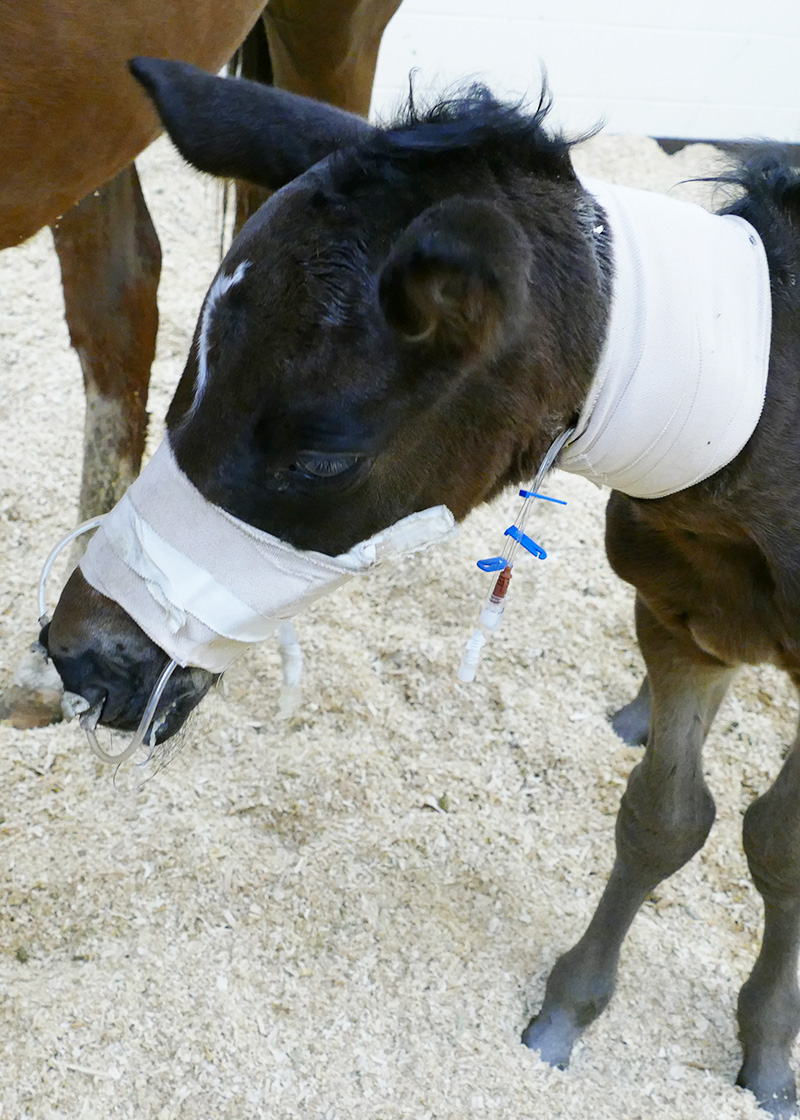Thoroughbred filly rallies after a very rocky start
July 14, 2022

"So Charming," an eight-year-old Thoroughbred mare and her newborn filly foal, owned by Dr. Ronald Harris Parker and under the care of Shamrock Farm, Maryland, visited the Equine Medical Center for emergency evaluation, diagnosis and treatment.
The foal was born full-term, but the foal was wedged in the birth canal. This is referred to as a dystocia birth and is a potentially life-threatening situation for both mare and foal. Delivery of the foal was assisted on the farm, but after birth, it was noticed that the filly was not breathing.
Shamrock Farm staff immediately initiated chest compressions and mouth-to-mouth breathing, and the filly started to breathe. Overnight she was given assistance to stand and nurse. However, she was unable to suckle and became progressively weaker.
At 20 hours old, the filly foal was referred to the Equine Medical Center for further diagnosis and treatment. The foal arrived recumbent on the trailer with noticeably dull mentation. She was lifted onto a gurney and transported into the building for evaluation. During her physical exam, it became apparent that she was suffering from severe dehydration and low blood sugar and was in the early stages of septic shock.

The internal medicine team, led by Emily Schaefer, clinical assistant professor of equine medicine, diagnosed the filly with severe hypoxic-ischemic encephalopathy (brain damage caused by the lack of available oxygen during her birth) and moderate bronchopneumonia (the result of inhaling milk). Aggressive medical management was recommended with intravenous fluids, systemic antibiotics, and supportive care.
The mare and foal were admitted to the hospital, and a treatment plan for the foal focused on controlling systemic infection with intravenous antibiotics, rehydration, nutritional support, and gastro protectants.
During the first night of hospitalization, the filly was assisted to stand and had her recumbency changed every two hours. She could stand with assistance and grew stronger in her ability to stand but continued to display inappropriate udder-seeking behavior. Throughout the next day, she grew stronger and could bear weight and remained standing on her own for increasing periods. Her udder seeking improved, which also improved her urine output.
Medical management continued, and gradually the filly showed improvement in her mentation and ability to stand, as well as her nursing ability. After five days of hospitalization, she was ready to go home!
“As a breeder, you always hope for a healthy mare and foal after delivery, but sometimes there are traumatic complications. On April 8, I experienced one of those traumatic complications as my foal was in “harm’s way," said Dr. Parker.
"I am very thankful for the treatment administered by Shamrock Farm to stabilize my foal such that further treatment was possible. I am also grateful that we sought medical assistance from the Marion duPont Scott Equine Medical Center. The two vets that I dealt with, Drs. Schaefer and Estell. Both were empathetic, knowledgeable, and good communicators, keeping me current with accurate, complete, and timely information about my foal’s recovery. Above all else, both seemed to sincerely care," said Dr.Parker.
"I don’t wish this experience on anyone, but if it does occur, I would trust the well-being of my mare and foal to this medical center," he added.








